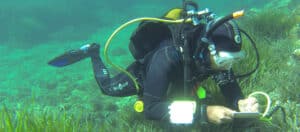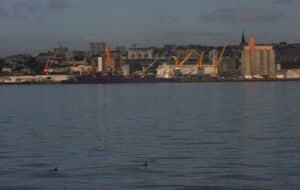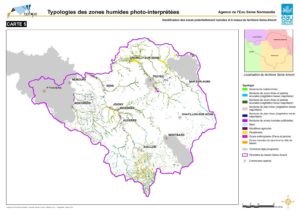Water and sea policy
- Home
- Our offers, your areas of activities
- Areas of activity
- Water and sea policy
Problems specific to these environments at risk
To assist you in protecting marine ecosystems and in taking regulations into account, including the “strategy for the marine environment” framework directive, Biotope conducts environmental studies suited to the specific problems of these environments.

Biotope works on your offshore activities, on research and development projects and programs, on issues related to the sustainable management of coastal environments or scientific knowledge, on the restoration of hydro-ecological continuities and on the functionality of aquatic environments and wetlands.
Characterisation study of priority wetlands in the Yerres watershed and management systems
Ambitious compensatory wetlands management and restoration goals were proposed.
In order to identify the wetlands in the Yerres watershedmore precisely, we were commissioned to conduct an initial study to refine the potential wet warning areas, then to perform a multi-criteria analysis of the features and the pressures on all potentially wet entities. This first study identified 8 550 hectares of “functional units of priority wetlands” divided into 217 priority units requiring a commitment to action.
The mission continues the previous one and pursues several objective :
- Overall consideration of these environments at the watershed scale ;
- To establish a regulatory delimitation of the 8550 ha of functional units in the priority wetlands identified in the study conducted in 2012-2013 ;
- To refine the characterisation (including the characterisation of the state of conservation) of the delimited wetlands through on-site investigations in order to establish a baseline of the delimited wetlands ;
- To define the desired reference state for each of the delimited wetlands ;
- To define the management objectives and identify the measures to be taken to achieve the defined reference state.
Identification of potentially wet areas and issues of the Seine upstream area
In implementing the Water Framework Directive (WFD), and with the objective of achieving good ecological status of water courses, Agence de l’Eau Seine-Normandie considers all wetlands a priority in its financial intervention policy for the X° program (2013-2018). At the level of the Seine-Amont sub-basin, the agency has identified the preservation of wetlands as a priority in its territorial priority action plan for 2013-2018.
To refine its intervention strategy and better guide the project owners in specific investigations (inventories, management, acquisition, etc.) on key areas, the Seine-Amont directorate wanted a pre-mapping to improve its knowledge of the wetlands across its entire territory (identification of wetlands not included in river corridors). A prioritisation phase of these wetlands was then conducted to direct the action programs toward sectors where the wetlands issue requires particularly urgent intervention.
Wintering seabird monitoring in Brest bay
The Brittany region commissioned us in 2013 to perform studies of seabirds in Brest Bayas part of the project for the development of the Brest port to receive EMR industries, requiring dredging as well as the extension of a polder.
Conducted in partnership with Bretagne Vivante, the studies involved simultaneous counts, monitoring from the coasts and inventories by boat. They contributed to the seabirds component of the project impact study in 2013/2014, updating the reference state before work in 2015/2016, and monitoring during work in 2017/2018. Other monitoring during works and then after the works are also expected in coming years.
